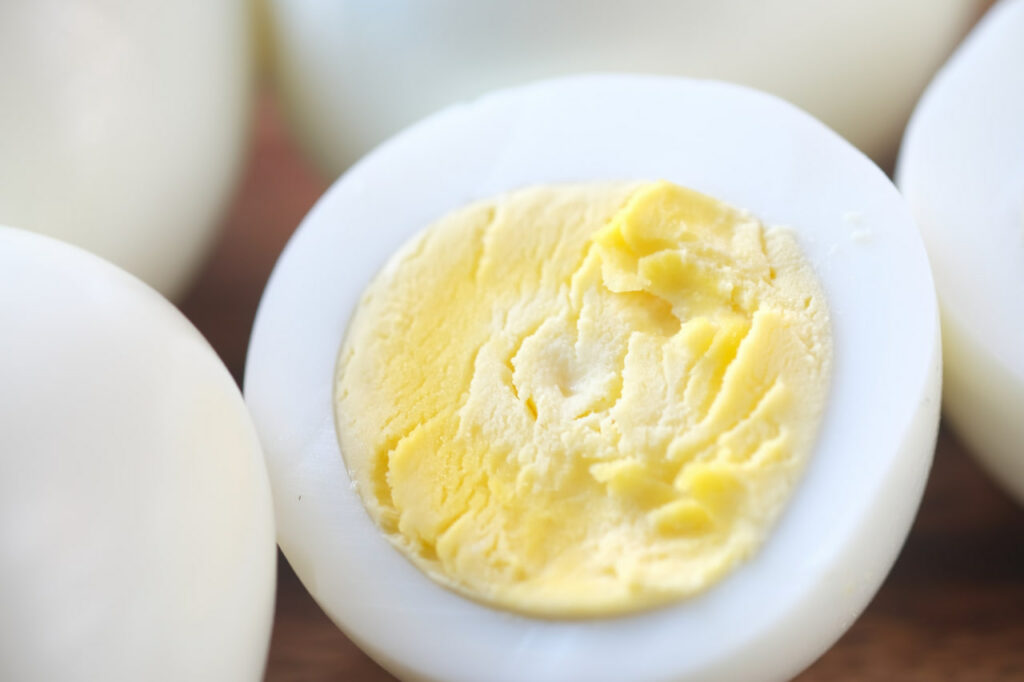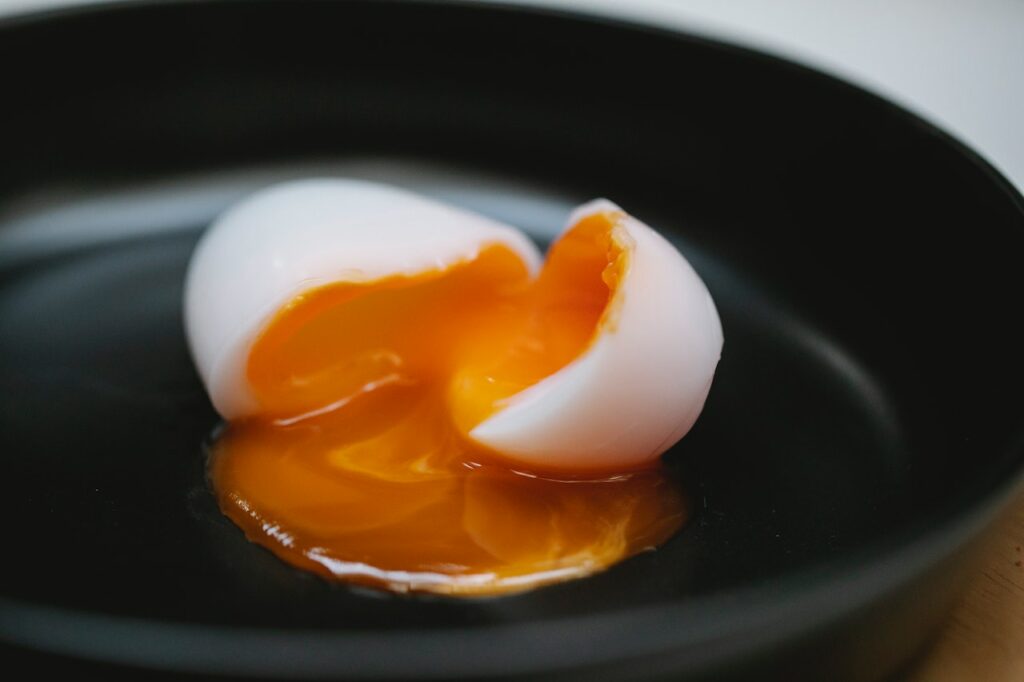Summary
Alright, fishy-friends, let’s dive deep! Can goldfish eat boiled eggs? Surprisingly, yes, they can! But before you head off to the kitchen to boil an egg for your finned friend, let’s go through the ins and outs of it. We’ll look at which parts of the egg are beneficial, how often they should be offered, and the best ways to serve them up.
Why Consider Boiled Eggs for Goldfish?
So, you’ve probably heard all sorts of advice on goldfish diets, and now you’re wondering about boiled eggs. Eggs, especially the yolks, are packed with proteins and essential fatty acids. And guess what? Your goldfish can benefit from these nutrients, too.

Are Boiled Eggs Safe For Fish To Eat?
Ah, the world of fish food. Dive into any fish enthusiast forum, and you’re bound to find varied opinions. When we talk about boiled eggs, though, it gets a tad murky. So, let’s unravel the mystery, shall we?
Firstly, let’s think about the wild. Fish don’t exactly have a hen laying eggs for them in their natural habitat, do they? But that doesn’t mean eggs are alien to them. Many fish species, in fact, nibble on eggs of other fish. It’s a part of the food chain.
Boiled eggs, specifically, are not inherently harmful. They’re just cooked eggs, after all. The yolk, as you might know, is chock-full of nutrients—protein, fatty acids, and vitamins. These nutrients can benefit fish just as they do us humans. The white part? Well, it’s mainly protein. It won’t harm your fish, but it doesn’t pack the nutritional punch that the yolk does.
However, there’s a catch. Like any other treat, it’s about moderation. Overfeeding, even with something as nutritious as boiled eggs, can upset their delicate tummies. Think of it as giving a kid too much candy; not the best idea, right?
Another thing to consider is the water quality. Eggs, especially if they begin to decay, can contaminate the tank water. It’s crucial to keep an eagle eye on the tank and remove uneaten egg bits after a while.
In conclusion? It’s not about whether boiled eggs are safe for fish; it’s about how you serve them. Moderation, vigilance, and a good understanding of your fish’s dietary needs are key. So, if you’re thinking about dishing out a tiny egg treat for your finned friend, go for it! Just be smart about it.

The Whole Egg Conundrum: Yolk vs. White
When pondering if goldfish can eat egg yolk or egg white, there’s a clear winner here. Egg yolk is packed with the nutrients that can benefit your goldfish. Egg white, on the other hand, is primarily protein. While it’s not harmful, the yolk is where the real benefits lie.
How to Prepare and Feed a Boiled Egg to a Fish
Feeding your fish something out of the ordinary, like a boiled egg, might have you feeling a tad out of your depth. I’ve been there, trying to decipher if I’m about to serve a five-star meal or an epic fail. But don’t fret; I’ve got you covered. Here’s a simple, human-approved guide on doing it right:
1. Choose Your Egg:
Opt for a fresh egg, preferably organic if possible. It might sound fancy, but fewer chemicals mean a happier tank in the long run.
2. Boil It Up:
Place your egg in a saucepan, cover it with water, and bring it to a boil. Let it boil for about 10 minutes to ensure it’s hard-boiled and any potential bacteria are destroyed. After boiling, transfer the egg to cold water. This will make peeling a whole lot easier.
3. Separate Yolk from White:
Once you’ve peeled the egg, gently split it in half. The yolk and the white will separate easily. While both parts are fish-friendly, the yolk is rich in nutrients and tends to be a favorite among our aquatic pals.
4. Mash the Yolk:
Using a fork, mash the yolk into a soft, crumbly texture. This makes it easier for your fish to nibble on and ensures they won’t choke on larger chunks.
5. Time to Serve:
With a spoon or your fingers, sprinkle a small portion of the mashed yolk into the tank. If you have smaller fish, a pinch is ample to begin with. For larger fish, adjust the portion size accordingly.
6. Observe:
This is the fun part! Watch how your fish reacts to the egg treat. Some might dart right to it, while others might need a moment of contemplation.
7. Clean-Up, Clean-Up:
Now, the slightly less fun part, but equally important. After about 20 minutes, use a net or siphon to remove any uneaten yolk bits. This ensures your tank stays clean and your water remains uncontaminated.
8. Keep a Schedule:
While it might be tempting to treat your fish to eggs frequently due to their evident joy, remember moderation is key. Once a week or even less is a good frequency.
There you have it! A simple, no-fuss method to treat your fish to a nutritious boiled egg. It might be unconventional, but sometimes, thinking outside the box (or tank) leads to some delightful discoveries. Happy feeding!

Hard-Boiled or Soft-Boiled?
The next egg-citing question on your mind might be about hard-boiled versus soft-boiled. Can goldfish eat hard boiled eggs, or should they be soft? Either works. The main thing is to ensure that the egg is thoroughly cooked to kill any potential bacteria.
Chicken Eggs or Just Any Eggs?
You may wonder if goldfish can eat chicken eggs or if any old egg will do. While chicken eggs are the most commonly available, and yes, goldfish can eat chicken eggs, the main concern is the size. A tiny goldfish won’t be able to handle big chunks, so always ensure the portions are appropriately sized.
Serving Suggestions for Your Golden Buddy
Goldfish can be quite picky. If you’re introducing boiled eggs, start with a tiny piece of yolk. Watch how they react. Remember to remove any uneaten bits to keep the water clean. And a pro tip? Mash the yolk up a little to make it easier for them to nibble on.
But…What About Scrambled Eggs?
Hold up! Can goldfish eat scrambled eggs? While not a traditional choice, in theory, they can. However, ensure it’s plain without any added seasonings or oils. But considering the ease of boiled eggs, that’s probably the way to go.
Risks and Considerations
Like all treats, moderation is key. Too much of a good thing can upset your goldfish’s tummy. Boiled eggs should be an occasional treat, not a staple in their diet. Always observe your fish after introducing a new food item.

Method of Feeding
Navigating the waters of fish feeding can sometimes feel like an art more than a science. Especially when we venture into unconventional foods like boiled eggs, it’s essential to get the method right. Here’s a human-to-human guide on how to tread these waters safely:
1. Portion Control:
You know how when you’re trying a new dish, you don’t gobble up a massive plate right away? The same principle applies to your fish. Start small. For goldfish, a pea-sized portion of boiled egg yolk should suffice. If you have a bigger fish, adjust accordingly.
2. Preparation:
Once you’ve boiled the egg, separate the yolk from the white. Though both parts are safe, the yolk is the nutrient powerhouse. Mash it up a bit to ensure it’s soft and easy for your fish to nibble on.
3. Test and Observe:
Just as we all have our food preferences, fish do too. The first time you introduce boiled egg, watch closely. How does your fish react? Are they excited or indifferent? Their reaction will give you a good gauge on whether it’s a hit or a miss.
4. Clean-Up:
This is crucial. Any leftover egg bits can decay and compromise the water quality. After feeding, give your fish about 15 to 20 minutes to enjoy their treat. After that, scoop out any remnants. It might seem tedious, but trust me, it’s worth the effort for the sake of your fish’s environment.
5. Frequency:
Remember, while boiled eggs are nutritious, they shouldn’t replace the primary diet. Think of them as an occasional treat. Maybe once a week? Or even less frequently, depending on your fish’s response.
6. Monitor Health:
After introducing any new food, it’s good practice to keep an eye on your fish’s health. Notice any changes in their behavior, movement, or appearance. This will ensure that any potential issues are caught early.
Conclusion :Can Goldfish Eat Boiled Eggs?
So, to answer the burning question: yes, goldfish can eat boiled eggs, both the yolk and white. But as always, moderation and observation are crucial. Eggs can be a nutritious treat, but they shouldn’t replace the balanced diet that goldfish pellets or flakes offer.

FAQs
- Can goldfish eat boiled eggs?
Yes, they can, but in moderation. - How often should I give my goldfish boiled eggs?
As an occasional treat, maybe once a week in small amounts. - Can goldfish eat egg white?
They can, but the yolk offers more nutritional benefits. - Are there risks to feeding goldfish boiled eggs?
Overfeeding or not removing uneaten bits can lead to water contamination and digestive issues. - Why consider boiled eggs for goldfish?
They offer proteins and essential fatty acids beneficial to goldfish. - Can goldfish eat hard boiled eggs specifically?
Yes, whether hard or soft boiled, just ensure they’re fully cooked. - Do goldfish prefer a particular type of egg?
They can eat chicken eggs, which are most common, but the size and portion matter. - How should I serve the boiled egg to my goldfish?
Start with a tiny piece of yolk, and consider mashing it for easier consumption. - Can goldfish eat scrambled eggs?
They can, but ensure it’s plain with no added seasonings or oils. - What’s the primary concern with giving goldfish boiled eggs?
Overfeeding and not maintaining water quality. - Are chicken eggs the only type of egg suitable for goldfish?
No, but they’re the most commonly available and suitable in size. - Can goldfish eat egg yolk?
Yes, it’s packed with beneficial nutrients. - Is egg white harmful to goldfish?
Not harmful, but the yolk is more beneficial. - Should boiled eggs replace regular goldfish food?
No, they should be an occasional treat, not a staple. - Do all goldfish like boiled eggs?
Preferences vary. Always introduce new foods gradually and observe your fish’s reaction.
